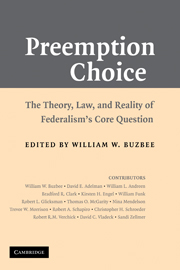Introduction
Published online by Cambridge University Press: 07 July 2009
Summary
Debates over the federal government's preemption power rage in the courts, in Congress, before agencies, and in the world of scholarship. Much of this debate has been prompted by unusually aggressive assertions of preemption power by federal agencies starting about 2006, but several major legislative battles have also involved preemption choice. The Supreme Court has also been on a preemption roll, hearing an unusually large number of preemption cases.
Little debate is possible over the basic parameters of federal preemption power – under the U.S. Constitution's Supremacy Clause, federal law reigns supreme and hence preempts any conflicting law or law that federal legislation deems preempted. A few Supreme Court cases in the 1990s reasserted judicial scrutiny of federal assertions of legislative power, while others strengthened state claims of sovereign immunity and protection from federal meddling. Nevertheless, seldom will preemption debates turn on underlying constitutional questions of federal power.
Instead, preemption debates tend to concern three basic questions. The first is political: should the federal government act to preempt, and thereby displace or nullify, regulatory turf that might otherwise be shared with state or local law, be it statutory or common law in origin? The second is interpretive: has a federal act actually preempted the laws or legal activities of these other actors? A fairly vast literature focuses on the third facet of preemption debates, parsing the vagaries of the Supreme Court's doctrinal expositions regarding preemption. This scholarship is critical and invaluable, given the Supreme Court's increasingly frequent acceptance of cases involving preemption issues.
- Type
- Chapter
- Information
- Preemption ChoiceThe Theory, Law, and Reality of Federalism's Core Question, pp. 1 - 10Publisher: Cambridge University PressPrint publication year: 2008
- 3
- Cited by



